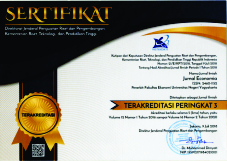Is The Human Capital Investment of Provincial Governments Productive in Decentralization Era?
Downloads
Abstract: Is The Human Capital Investment of Provincial Governments Productive in Decentralization Era? The effectiveness of government spending, especially investment in human capital, increases labor productivity also depends on how the local government determines the type of expenditure. The purpose of this study is to determine the effect of government spending in general and functionally to labor productivity. The approach used in this study is a quantitative approach, econometric method. This study uses secondary data from local government budgets across Indonesia summary provided by the Indonesian Ministry of Finance Directorate General of Regional Financial Balance. The data used is the provincial-level economic analysis units throughout Indonesia in 2012. This research shows that provincial government spending in human capital investment does not effectively increase labor productivity. Total provincial government spending does not affect the regional labor productivity. Government spending in the areas of public facilities and housing positively influence regional labor productivity.
Keywords: local government, human capital investment, labor productivity, fiscal decentralization, public spending
Abstrak: Produktifkah Human Capital Investment oleh Pemerintah Daerah Provinsi dalam Era Desentralisasi? Efektivitas pengeluaran pemerintah khususnya human capital investment dalam meningkatkan produktivitas tenaga kerja juga tergantung dari pemilihan pemda dalam menentukan jenis pengeluaran tersebut. Tujuan dari penelitian ini untuk mengetahui pengaruh pengeluaran belanja pemerintah secara umum maupun secara fungsional terhadap produktivitas tenaga kerja melalui pendekatan kuantitatif dengan metode ekonometrika. Penelitian ini menggunakan data sekunder dari ringkasan APBD pemda seluruh Indonesia yang disediakan oleh Kemenkeu Dirjen Perimbangan Keuangan Daerah RI. Data yang digunakan adalah data tahun 2012 dengan unit analisis perekonomian level provinsi seluruh Indonesia. Pengeluaran pemerintah provinsi secara total tidak mempengaruhi produktivitas tenaga kerja regional. Pengeluaran pemerintah daerah provinsi dalam fungsi human capital investment tidak efektif meningkatkan produktivitas tenaga kerja meski demikian pengeluaran pemerintah dalam bidang fasilitas umum dan perumahan mempengaruhi secara positif produktivitas tenaga kerja regionalnya.
Kata Kunci: pemerintah daerah, human capital investment, produktivitas tenaga kerja, desentralisasi fiskal, pengeluaran pemerintah
Downloads
Agrawal, A. & Ribot, J. (2002). Analyzing Decentralization: A Frame Work with South Asian and East African Environmental Cases. Working Paper Series. Institutions and Governance Program World Resources Institute. Washington. D.C. 20002.
Bardhan, P. & DilipMookherjee (2005). Decentralization. Corruption and Government Accountability: An Overview. For `Handbook of Economic Corruption' edited by Susan Rose-Ackerman. Edward Elgar. Revised. June 20 2005.
Dao, M.Q. (2012). Government Expenditure and Growth in Developing Countries. Progress in Development Studies 12(1), 77–82.
Denaux, Z.S. (2007). Endogenous Growth. Taxes and Government Spending: Theory and Evidence. Review of Development Economics. 11(1), 124-138.
Gupta, S., et.al. (2002). Fiscal Dimensions of Sustainable Development. Prepared for World Summit on Sustainable Development Johannesburg. August 26–September 4. 2002. Washington. D.C.: International Monetary Fund. Fiscal Affairs Dept. 2002.
Kaufman, Daniel, AartKraay, & Mastruzzi, M. (2006). Governance Matters V: Aggregate and Individual Governance Indicators for 1996-2005. The World Bank. September 2006.
Kemenkeu (2012). Nota Keuangan Dan Rancangan Anggaran Pendapatan Dan Belanja Negara Tahun Anggaran 2013 Republik Indonesia. Kemenkeu RI.
Kemenkeu (2012). Ringkasan APBD Pemda seluruh Indonesia. Kemenkeu. Dirjen Perimbangan Keuangan Daerah.
Kemenkeu (2013). Evaluasi Belanja Modal Daerah. Dirjen Perimbangan Keuangan Daerah Kemenkeu RI 2013.
Kyriacou, A.P. & Roca-Sagalés, O. (2008). Fiskal Decentralization and The Quality of Government: Evidence from Panel Data. Universitat Autí²noma de Barcelona: Instituto de Estudios Fiskales.
La Porta, R., Lopes-de-Silanez, F., Shleifer, A., & Vishny, R. (1998). The Quality of Government. NBER Working Paper No.6727. September 1998.
Lyakurwa, W.M. (2007). Human Capital and Technology for Development: Lessons for Africa. ADB Annual Meetings Symposium. Shanghai. China14-17 May 2007.
Oluwatobi, S.O., & Ogunrinola, O.I. (2011). Government Expenditure on Human Capital Development: Implications for Economic Growth in Nigeria. Journal of Sustainable Development. 4,(3), 72-80.
Stansel, D. (2009). Local Government Investment and Long-Run Economic Growth. The Journal of Social. Political. and Economic Studies, 34(2), 244.
Suprayitno, B. (2011). Desentralisasi Fiskal Dan Korupsi: Fakta Dalam Otonomi Daerah Di Indonesia. Thesis. UGM tidak dipublikasikan.
Suryanto (2014). Menyoal Desentralisasi Fiskal: Mempertanyakan Akuntabilitas Keuangan Pemerintahan Daerah. Diakses dari http://www.stialan.ac.id 19 Agustus 2014:6.59.
Treisman (2002). Decentralization and the Quality of Government. Department of Political Science. University of California. Los Angeles. October. 2002.
UNDP (2010). Peningkatan Kinerja Pembangunan Daerah: Alat-alat Praktis dari Indonesia. BAPPENAS dan UNDP. Indonesia April 2010.
Yeoh, M. & Stansel, D. (2013). Is Public Expenditure Productive? Evidence from the Manufacturing Sector in U.S. Cities. 1880–1920. Cato Journal. 33(1).















